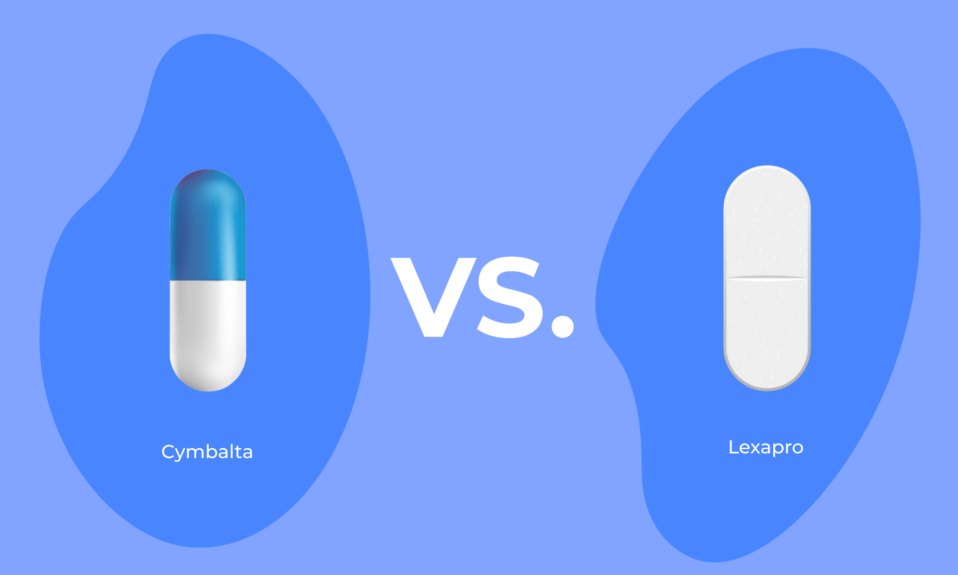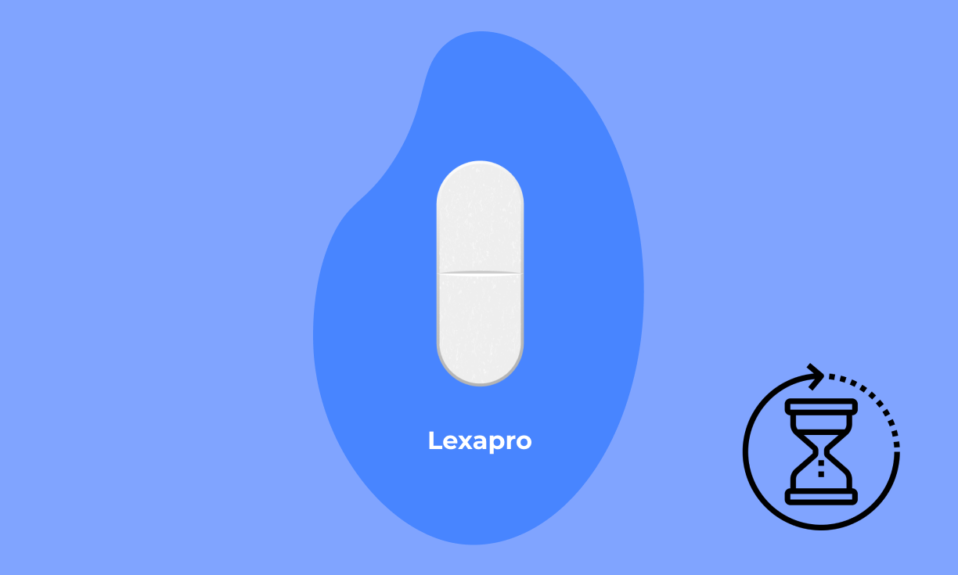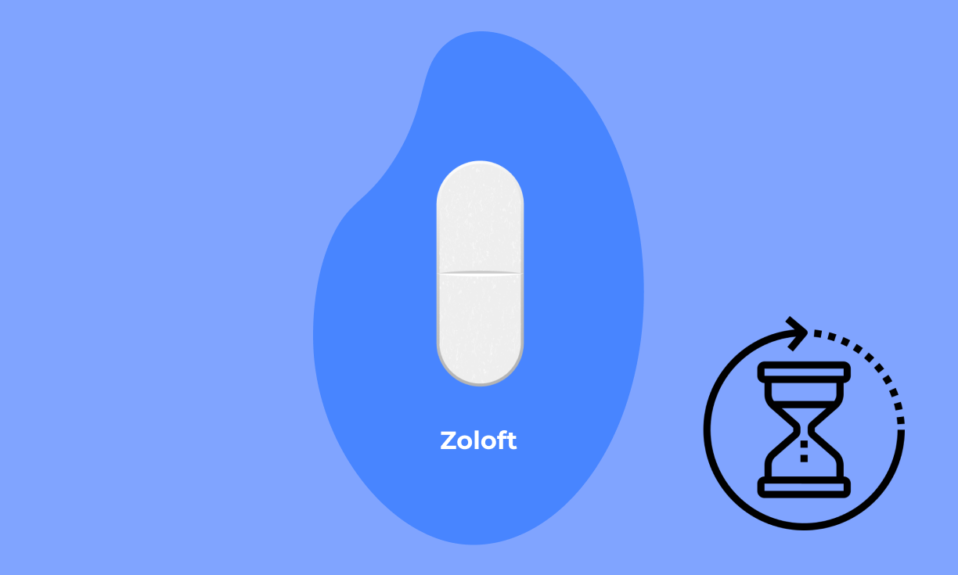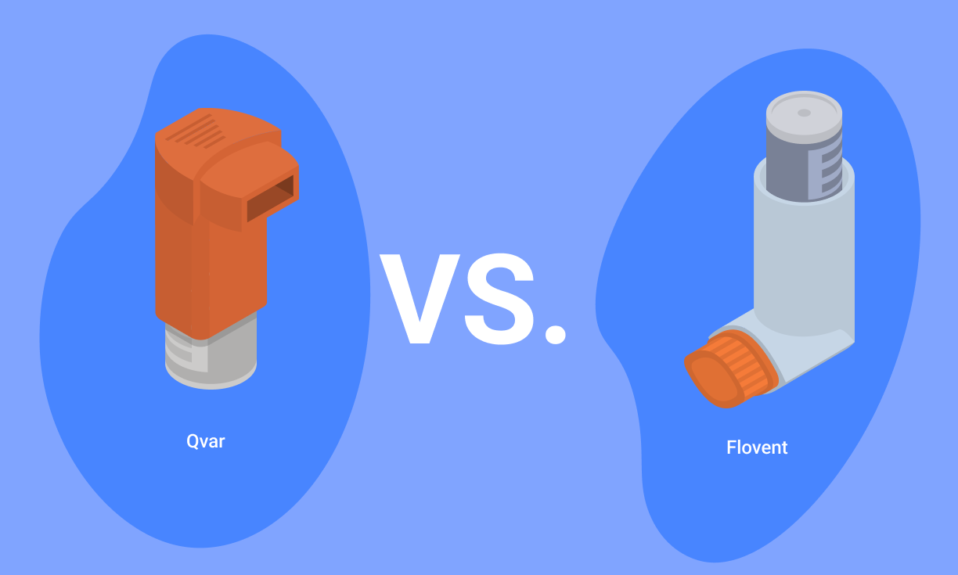Table of Contents Hide
- Cymbalta
- Lexapro
- Differences
- Which One is More Effective?
- Interactions
- Side Effects
- Conclusion
- FAQs
- Which has fewer side effects, Lexapro or Cymbalta?
- What are the worst side effects of Cymbalta?
- What are the worst side effects of Lexapro?
- Is Cymbalta good for treating anxiety?
- Are Cymbalta and Lexapro the same?
- Can I use Cymbalta or Lexapro while pregnant?
- Can I use Cymbalta or Lexapro with alcohol?
- Does Cymbalta make you happy?
- References
Depression affects over 21 million adults in the United States. It is characterized by a period of low mood for at least a two-week period, associated with common symptoms such as loss of interest in daily activities, sleep, energy, appetite, and self-worth.
According to ADAA.org, generalized anxiety disorder affects 6.8 million adults in the United States. It is characterized by excessive worry about normal stressors including finances, family, health, and work. A clinical diagnosis is given when such worry lasts for over six months.
Cymbalta and Lexapro are two commonly used prescription drugs for treating depression and anxiety. This article discusses the differences between the two drugs and their side effects and interactions.
Cymbalta
Cymbalta is a selective serotonin and norepinephrine reuptake inhibitor antidepressant (SNRI). It comes in a generic form by the name of Duloxetine.
Cymbalta affects chemicals in the brain that may be unbalanced in people with depression. It is used to treat major depressive disorder in adults.
Lexapro
Lexapro is an antidepressant from a group of drugs called selective serotonin reuptake inhibitors (SSRIs). It comes in a generic form by the name of Escitalopram.
Lexapro is used to treat certain types of depression and anxiety. It works by balancing levels of serotonin in the brain and nerves.
Differences
While Cymbalta and Lexapro can both be used to treat these conditions, there are some significant differences between the two medications.
Active Ingredients
Cymbalta contains the active ingredient duloxetine, while Lexapro contains escitalopram.
Cymbalta belongs to a group of antidepressants known as selective serotonin-norepinephrine reuptake inhibitors (SNRIs). SNRIs block the reuptake of both norepinephrine and serotonin, leading to mood upliftment.
Lexapro on the other hand belongs to a group of antidepressants known as selective serotonin reuptake inhibitors (SSRIs). Lexapro works by blocking the reuptake of serotonin, which also results in its effectiveness as an antidepressant.
Name and Manufacturer
Cymbalta was introduced in the US market by Eli Lilly in 2004 and the generic versions of the drug were approved in 2013.
Lexapro was manufactured by Abbvie in 2002 and since 2012 there have been generic versions of this medication available.
Form
Cymbalta comes in a capsule and an extended-release option. Lexapro comes in a pill and liquid option.
Strength
Cymbalta is available in 20 mg, 30 mg, and 60 mg oral capsules. Lexapro is available in 5 mg, 10 mg, and 20 mg tablets and 5 mg – 5 ml liquid.
| Cymbalta | Lexapro | |
| Antidepressants | Drug Class | Antidepressants |
| SSNI | Type | SSRI |
| Depression Anxiety Diabetic neuropathy (nerve damage) Fibromyalgia Chronic muscle pain Urinary incontinence (women) | Conditions Treated | Depression Anxiety Panic disorder |
| Duloxetine | Generic Form | Escitalopram |
| Capsule, Extended Release | Different Forms | Pill, Liquid |
| 60mg once per day | Administration | 10mg once per day |
| As long as required, could be indefinite | How long is the typical treatment? | As long as required, could be indefinite |
| Adults and adolescents | Who can use the medication? | Adults and adolescents |
Check out other Drug vs. Drug articles here.
Which One is More Effective?
Most studies have largely been inconclusive as to which of the drugs is better in terms of treating depression. However, the studies do mention that patients on Cymbalta might be more likely to discontinue treatment due to adverse effects.
Interactions
Both Cymbalta and Lexapro treat conditions that are accompanied with other conditions. Hence, one should take clinical advice from the physician and pharmacist on interactions with other drugs.
There is a significant number of drugs that interact with Cymbalta with some common ones noted below:
- gabapentin
- levothyroxine
- lisinopril
- Lyrica (pregabalin)
- metformin
- omeprazole
- tramadol
- trazodone
- Vitamin D3 (cholecalciferol)
- Xanax (alprazolam)
Following are some most commonly known drug interactions for Lexapro:
- Abilify (aripiprazole)
- Adderall (amphetamine / dextroamphetamine)
- aspirin
- clonazepam
- gabapentin
- Klonopin (clonazepam)
- Lamictal (lamotrigine)
- levothyroxine
- Lipitor (atorvastatin)
- lisinopril
- metformin
- omeprazole
- Seroquel (quetiapine)
- Synthroid (levothyroxine)
- tramadol
- trazodone
- Vitamin D3 (cholecalciferol)
- Wellbutrin XL (bupropion)
- Xanax (alprazolam)
- Zyrtec (cetirizine)
Side Effects
Some of the common side effects of Cymbalta are:
- Nausea
- Headache
- Dry mouth
- Tiredness
- Trouble sleeping
- Constipation
- Dizziness
- Diarrhea
- Decreased appetite
- Increased sweating
- Stomach pain
Source: FDA
Some common side effects of Lexapro are as follows:
- Nausea
- Trouble Sleeping (insomnia)
- Ejaculation problems
- Diarrhea
- Tiredness
- Dry mouth
- Dizziness
- Sweating
Source: FDA
If you ever experience any of these, talk to a doctor and seek medical attention immediately.
Conclusion
Both these drugs come associated with a lot of side effects and warnings. They also need to be taken for a period of several weeks before they start becoming effective. The preference of one over the other will be determined by your physician, based on your personal clinical history and various factors.
FAQs
Which has fewer side effects, Lexapro or Cymbalta?
Lexapro (escitalopram) is generally considered good for treating depression and anxiety due to fewer side effects and interactions. It might not be a good choice if there are pre-existing liver or heart problems. Cymbalta (duloxetine) may help relieve nerve pain from diabetes and other forms of chronic pain in addition to treating depression and anxiety.
What are the worst side effects of Cymbalta?
Cymbalta (duloxetine) is frequently associated with nausea, headache, and dry mouth as the most common side effects.
What are the worst side effects of Lexapro?
Lexapro (escitalopram) is frequently associated with nausea, insomnia, and diarrhea as the most common side effects.
Is Cymbalta good for treating anxiety?
Cymbalta (duloxetine) is good for treating depression, anxiety, and some forms of long-term pain. However, it may not be as effective if you drink alcohol or have high blood pressure.
Are Cymbalta and Lexapro the same?
While both Cymbalta and Lexapro treat depression and anxiety, they are not the same. Cymbalta is an SNRI that blocks the reuptake of both serotonin and norepinephrine in the neuronal synapse, while Lexapro is an SSRI that blocks serotonin reuptake only. Cymbalta carries additional indications for pain disorders.
Can I use Cymbalta or Lexapro while pregnant?
Both Cymbalta and Lexapro are considered by the FDA as pregnancy category C, which means there isn’t conclusive data on fetus safety.
With Cymbalta, non-teratogenic effects have been observed in newborns following the administration of Cymbalta while pregnant. These include respiratory distress, feeding difficulty, and tremors.
With Lexapro use, animal studies have shown teratogenic effects on the fetus, including cardiovascular effects, and it has been determined that it crosses the human placenta.
For these reasons, the use of Cymbalta or Lexapro in pregnancy must be weighed against potential harm to the fetus.
Can I use Cymbalta or Lexapro with alcohol?
Cymbalta and Lexapro can both become more toxic when combined with alcohol. Drinking alcohol while taking these drugs can cause significant psychomotor impairment. Cymbalta increases the likelihood of hepatic failure as well.
Does Cymbalta make you happy?
Cymbalta works by suppressing the absorption of norepinephrine and serotonin. The presence of these neurotransmitters can make patients report feeling less depressed or happy after four to six weeks of clinically guided treatment.
References
https://www.nimh.nih.gov/health/statistics/major-depression
https://www.accessdata.fda.gov/drugsatfda_docs/label/2020/021427s052lbl.pdf
https://adaa.org/understanding-anxiety/generalized-anxiety-disorder-gad
https://www.webmd.com/depression/ssris-myths-and-facts-about-antidepressants
https://www.mayoclinic.org/diseases-conditions/depression/in-depth/antidepressants/art-20044970









